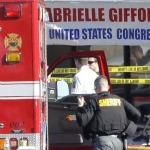Why Political Violence Fails in America
 The shootings in Tucson were horrific. But as my latest column for CNN points out, the event has also reminded us of the strength of the American political consensus.
The shootings in Tucson were horrific. But as my latest column for CNN points out, the event has also reminded us of the strength of the American political consensus.
The shootings in Tucson were horrific. But as my latest column for CNN points out, the event has also reminded us of the strength of the American political consensus.
When people call the shootings in Tucson senseless, they are absolutely right. By all reports, the alleged Tucson shooter was seriously mentally ill and quite probably schizophrenic.
The congresswoman he shot and the judge he killed had been targets of violent threats from political extremists. But the shooter himself was not a political extremist in any meaningful sense of that term.
In this, the Tucson shooter follows a familiar pattern in recent American life.
-- A sniper terrorized the Washington, D.C., suburbs in the fall of 2002, killing at least 10 people. It was widely assumed that the motive was Islamic terrorism, an assumption strengthened when the killer was identified as a convert to the Nation of Islam. Yet while John Allen Muhammad used the language of jihad, he seemed at least as motivated by revenge against his ex-wife and greed for the ransom he hoped to extort from the U.S. government.
-- In October 1994, gunman Francisco Duran fired 29 shots over the White House fence at a group he believed to include President Clinton. Duran later explained that he was trying to protect the world from space aliens.
-- John Hinckley shot and almost killed President Reagan in hopes of gaining the attention of the actress Jodie Foster, with whom Hinckley was obsessed.
-- Of the two attempts on the life of President Ford, one was carried out by a member of the Charles Manson cult; the other by a supporter of the bizarre Symbionese Liberation Army.
-- The gunman who crippled Alabama Gov. George Wallace during his 1972 presidential campaign wrote a diary detailing his motive: a quest for personal fame.
The United States has a long history of more strictly political violence, from the assassination of President Lincoln through the 1960s murders of Medgar Evers, Martin Luther King and John and Robert Kennedy. And of course we have a new exposure to international terrorism, especially from Islamic extremists.
Yet since 1970 -- and despite horrific throwbacks such as the 1995 Oklahoma City bombing -- the political aspect of home-grown violence has receded. ...
Click here to read the rest.